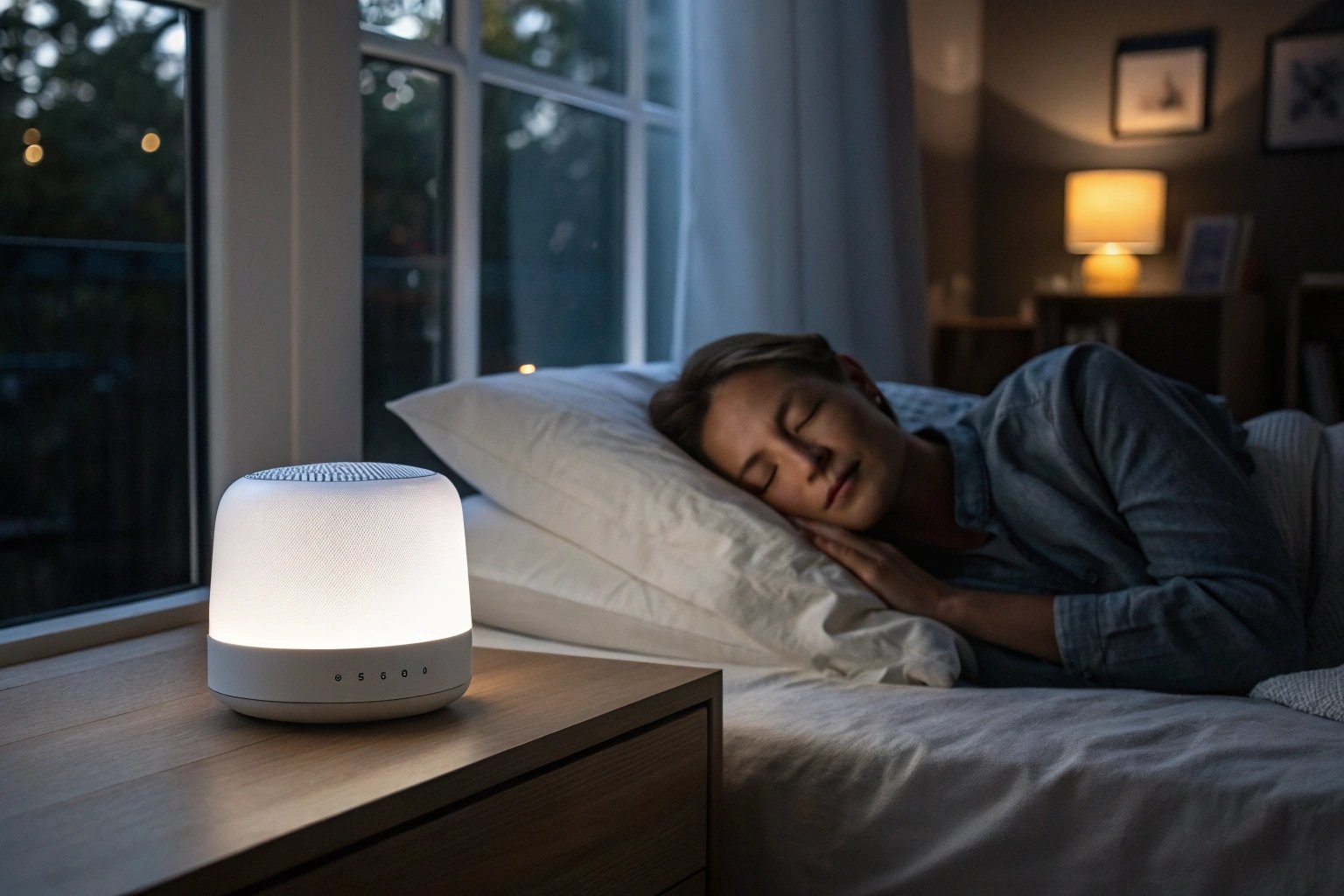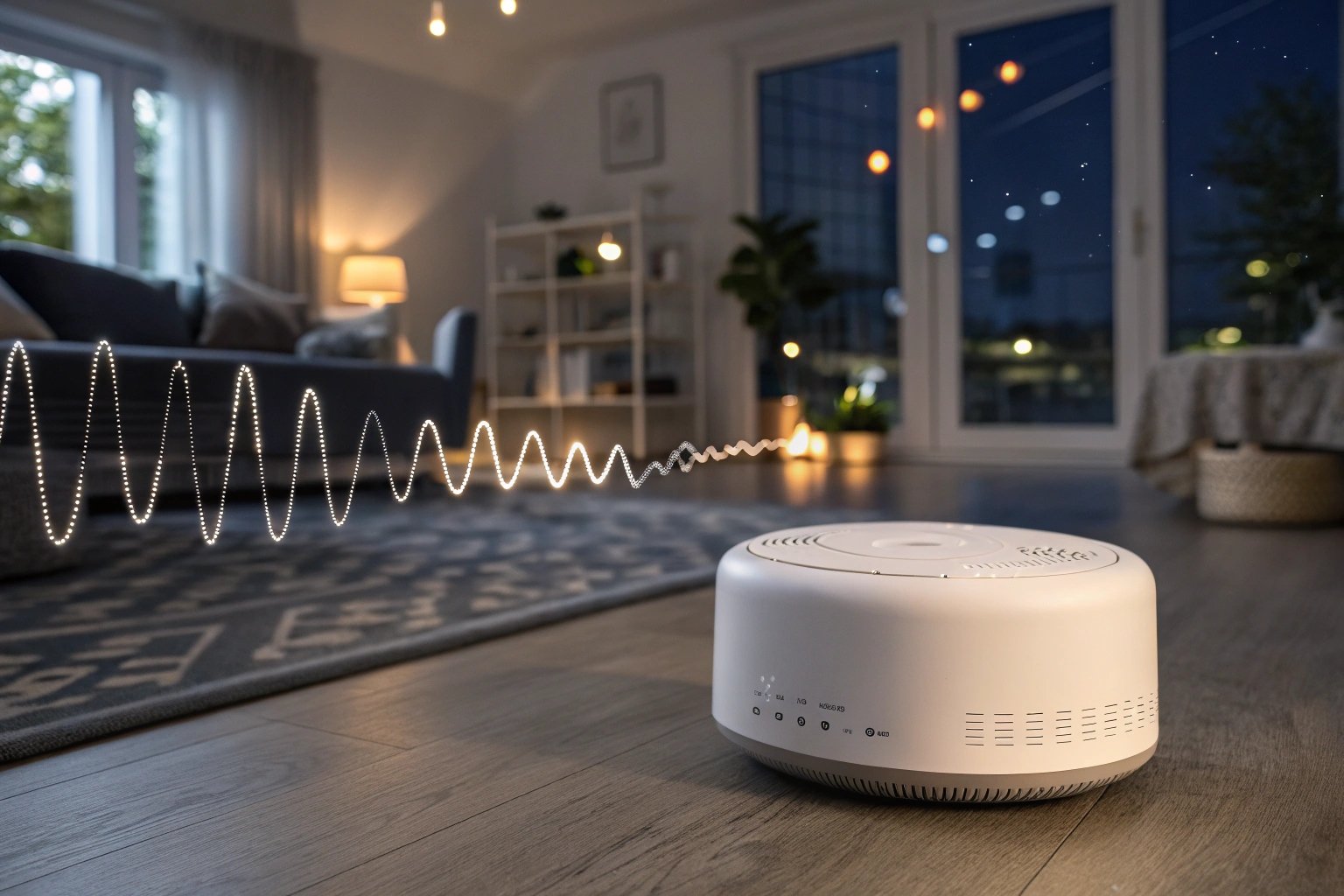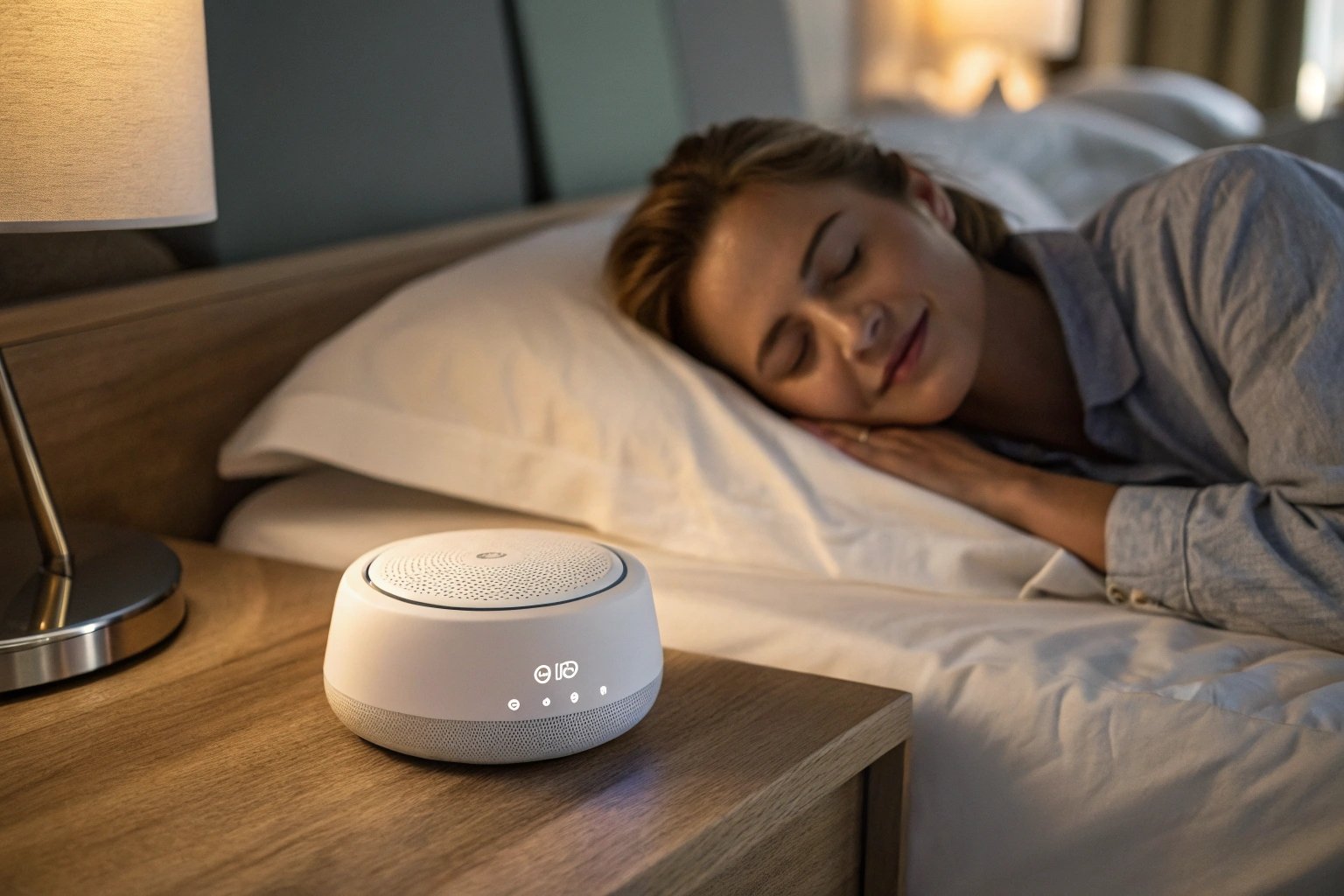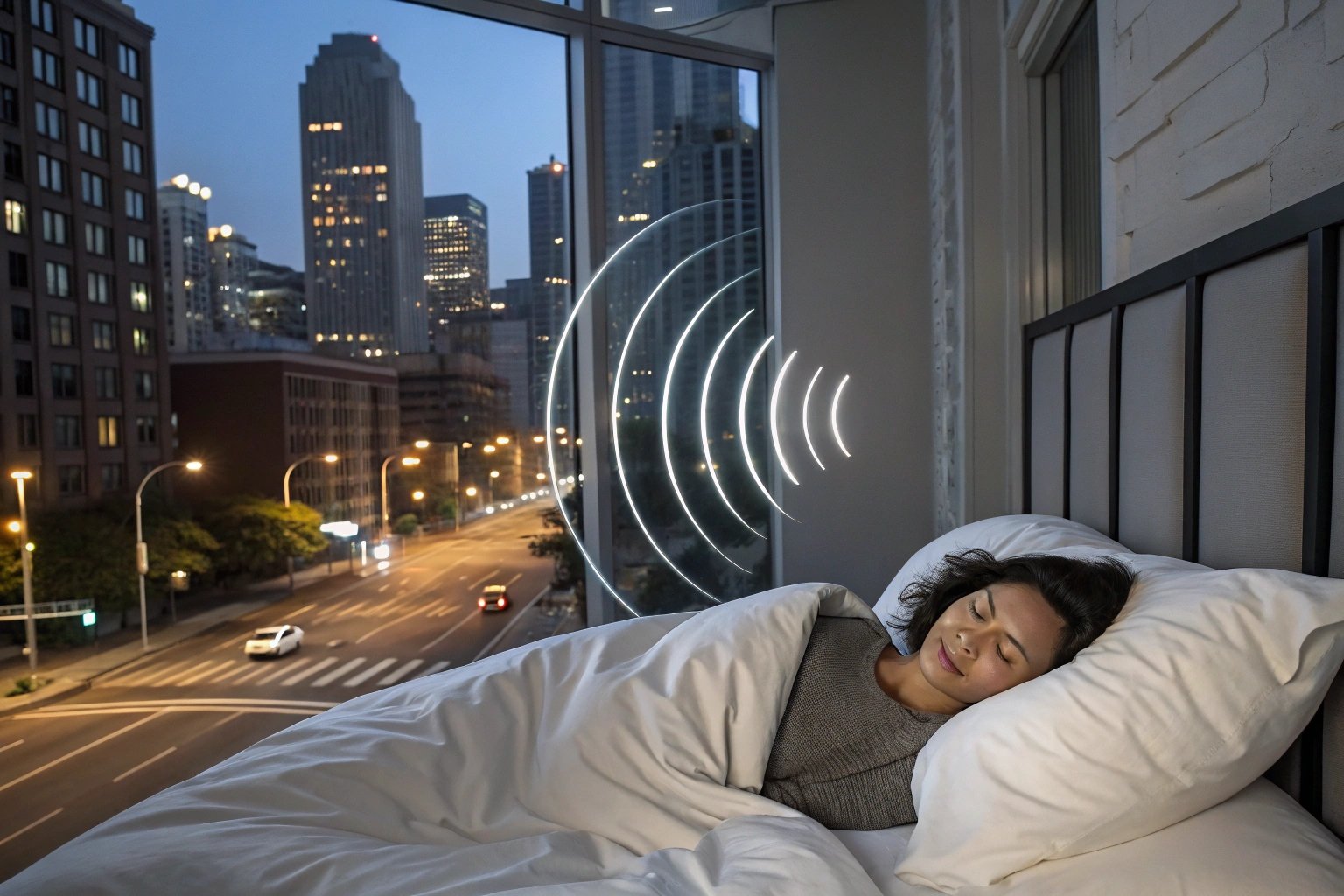White noise is an often-overlooked tool when it comes to improving sleep. It works by providing a constant, soothing sound that helps mask disruptive noises in your environment. For people who have trouble falling asleep or staying asleep due to environmental disturbances, white noise can be the key to achieving a more peaceful, uninterrupted night of rest. But how does it actually work, and what are the benefits of using white noise for sleep?

White noise helps to cover up background noises, making sudden sounds less jarring. It creates a constant sound environment that your brain becomes accustomed to, allowing you to relax without the fear of being awakened by unexpected disruptions. This has been shown to improve the quality and duration of sleep for many individuals.
What Is White Noise and How Does It Work?

White noise is a consistent sound that covers a range of frequencies, all played at equal intensity. It’s often described as a static-like sound, similar to the noise produced by an untuned radio or a fan. This uniform sound is effective because it masks other noises in the environment that might disturb your sleep. The human brain is wired to be sensitive to changes in sound, so any abrupt noise—whether it’s a car horn outside or the creak of floorboards—can trigger a stress response. White noise neutralizes these changes by providing a continuous, non-disruptive sound that helps you stay asleep throughout the night.
The primary benefit of white noise lies in its ability to mask other sounds. For example, if you live in a city where traffic noise is constant, the sound of white noise can help reduce the perception of these sounds. By making the external environment more consistent, your brain doesn't have to stay alert to outside noises. This helps you relax and fall asleep faster, leading to more restful sleep cycles.
Can White Noise Really Help You Fall Asleep Faster?

Falling asleep can be a challenge for many people, especially in environments with fluctuating or unpredictable sounds. White noise offers a solution by creating a constant auditory environment that signals to your brain it’s time to rest. As a result, your mind is less likely to wander, and you're able to transition into sleep more quickly. White noise doesn’t compete with your brain for attention the way sudden noises do. Instead, it promotes a sense of calm, which makes it easier to fall asleep.
White noise acts as a gentle background sound that the brain learns to tune out. In fact, studies have shown that people who use white noise fall asleep faster compared to those who sleep in quieter environments. For people with insomnia or those who struggle with racing thoughts, the calming nature of white noise can provide the necessary environment to relax and initiate sleep, reducing the time it takes to fall into a restful state.
Does White Noise Improve Sleep Quality?
Sleep quality is not just about the amount of sleep you get, but how deep and restorative that sleep is. White noise plays a critical role in maintaining deeper stages of sleep by masking disruptions that could otherwise cause awakenings during the night. Environmental noises such as traffic, people talking, or household sounds can interrupt your sleep cycles, leading to lighter, less restorative sleep. White noise prevents these disturbances from reaching your conscious awareness, allowing you to stay in the deeper, more beneficial stages of sleep.
Research has shown that people who use white noise report fewer awakenings during the night and tend to experience longer periods of deep sleep. This is especially beneficial for people who are light sleepers or live in noisy environments. The steady sound of white noise helps maintain a consistent sleep environment, which promotes better sleep quality. With fewer interruptions and a more stable sleep environment, your body and mind can fully relax, leading to improved cognitive function, mood, and overall health.
Can White Noise Help You Sleep Better in Noisy Environments?

Living in a noisy environment can make it nearly impossible to get quality sleep. Whether it's traffic noise, loud neighbors, or even the hum of appliances, these sounds can disrupt your sleep, making it difficult to stay asleep throughout the night. White noise acts as an effective tool for drowning out these disturbances, allowing you to create a peaceful sleep environment regardless of external noise. By masking these environmental sounds, white noise ensures that your brain remains in a restful state.
For individuals living in cities or densely populated areas, the ability to block out external noise is essential for achieving a good night's sleep. White noise helps light sleepers, in particular, by providing a consistent background sound that prevents their brain from reacting to sudden, jarring noises. Over time, the brain begins to associate the white noise with sleep, which helps to reduce the impact of external disturbances and encourages more uninterrupted sleep.
Are There Any Risks of Using White Noise for Sleep?

While white noise offers a range of benefits, it's important to use it responsibly. There are potential risks associated with prolonged exposure to loud white noise, particularly for hearing health. Consistently using white noise at high volumes could contribute to hearing damage, especially if the sound is played too loudly for extended periods. It’s important to adjust the volume to a comfortable level where the sound is soothing, but not overwhelming.
Another consideration is that, for some people, white noise can become a crutch. If you use white noise every night, you may begin to rely on it to fall asleep. This could potentially make it harder for you to sleep without it, especially in quieter environments. While white noise is generally safe and effective, it’s crucial to use it in moderation and ensure that it doesn’t interfere with your natural sleep patterns.
Can White Noise Be Used to Treat Sleep Disorders?
White noise has been used to help individuals with sleep disorders, such as insomnia or sleep anxiety, by promoting relaxation and masking disruptive noises. For people who struggle with falling asleep due to environmental disturbances or racing thoughts, white noise offers a solution that doesn’t require medication. Its calming effect helps reduce the anxiety that often accompanies sleep disorders, making it easier to wind down and fall asleep naturally.
In fact, white noise is commonly used as part of cognitive behavioral therapy for insomnia (CBT-I), which is a treatment designed to help people improve their sleep habits. By incorporating white noise into the sleep environment, individuals can create a more consistent and peaceful atmosphere that facilitates better sleep. For those with sleep disorders, white noise can be an effective tool to help regulate sleep patterns and improve sleep quality over time.
Conclusion
White noise offers a simple yet effective solution for improving sleep. It helps mask disruptive sounds, enhances sleep quality, and supports deeper, more restorative sleep cycles. Whether you struggle with environmental noise or sleep disorders, incorporating white noise into your routine can make a significant difference in the quality of your rest.

